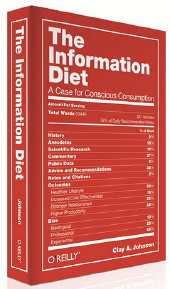Is Your Information Diet Full of Junk Food?
Clay Johnson’s new book “The Information Diet: A Case for Conscious Consumption” makes the case that “much as a poor diet gives us a variety of diseases, poor information diets give us new forms of ignorance — ignorance that comes not from a lack of information, but from overconsumption of it.”
Topics

Food companies sell cheap calories by loading on salt, fat and sugar. Media companies sell cheap ideas by loading on affirmation, writes Clay Johnson.
Do you have a healthy information diet? Or one that slows you down with the equivalent of too much fast food?
That’s the question posed by Clay Johnson, who argues that “much as a poor diet gives us a variety of diseases, poor information diets give us new forms of ignorance — ignorance that comes not from a lack of information, but from overconsumption of it.”
Johnson’s new book, The Information Diet: A Case for Conscious Consumption (O’Reilly Media, 2012), is described in The Atlantic as “an intelligent manifesto for optimizing the 11 hours we spend consuming information on any given day in a way that serves our intellectual, creative, and psychological well-being.”
Johnson developed his ideas about how we consume information in the course of his work in media. He co-founded the new media consulting agency Blue State Digital, which lists on its web site a long collection of political, nonprofit, and brand clients including AT&T, Obama for America and Vogue magazine. He was director of Sunlight Labs at the Sunlight Foundation, an organization dedicated to “making government transparent and accountable,” where he “built an army of 2000 developers and designers to build open source tools to give people greater access to government data,” according to his bio.
Johnson’s proposed solution, writes the Atlantic’s Maria Popova, “lies in engineering a healthy relationship with information by adopting smarter habits and becoming as selective about the information we consume as we are about the food we eat.” Thoughtful consumption is necessary to keep from getting sidetracked in part by what Popova succinctly calls “Hollywood’s entertainment lard.”
Johnson writes:
Personal responsibility in an age of mostly free information is vital to individual and social health. If we want our communities and our democracies to thrive, we need a healthier information diet.
. . . Just as food companies learned that if they want to sell a lot of cheap calories, they should pack them with salt, fat, and sugar — the stuff that people crave — media companies learned that affirmation sells a lot better than information. Who wants to hear the truth when they can hear that they’re right?
Chapter 7 of the book, on “Data Literacy,” might be the most relevant for managers. It covers “the vast sea of textual, audio, and video data that we wade in every day.” Synthesizing information is hard work in a world where “we’d all rather argue or be entertained,” Johnson writes. That’s where the metaphor of food and diet kick in, with Johnson’s emphasis that these are skills that are easier to practice if you make a conscious effort to.

Comments (3)
Revising My Infodiet: Taking a look at something new | LIVE, LAUGH, LEARN
Thoughtful Consumption of Information | WC Bracken
Is Your Information Diet Full of Junk Food? « Serve4Impact